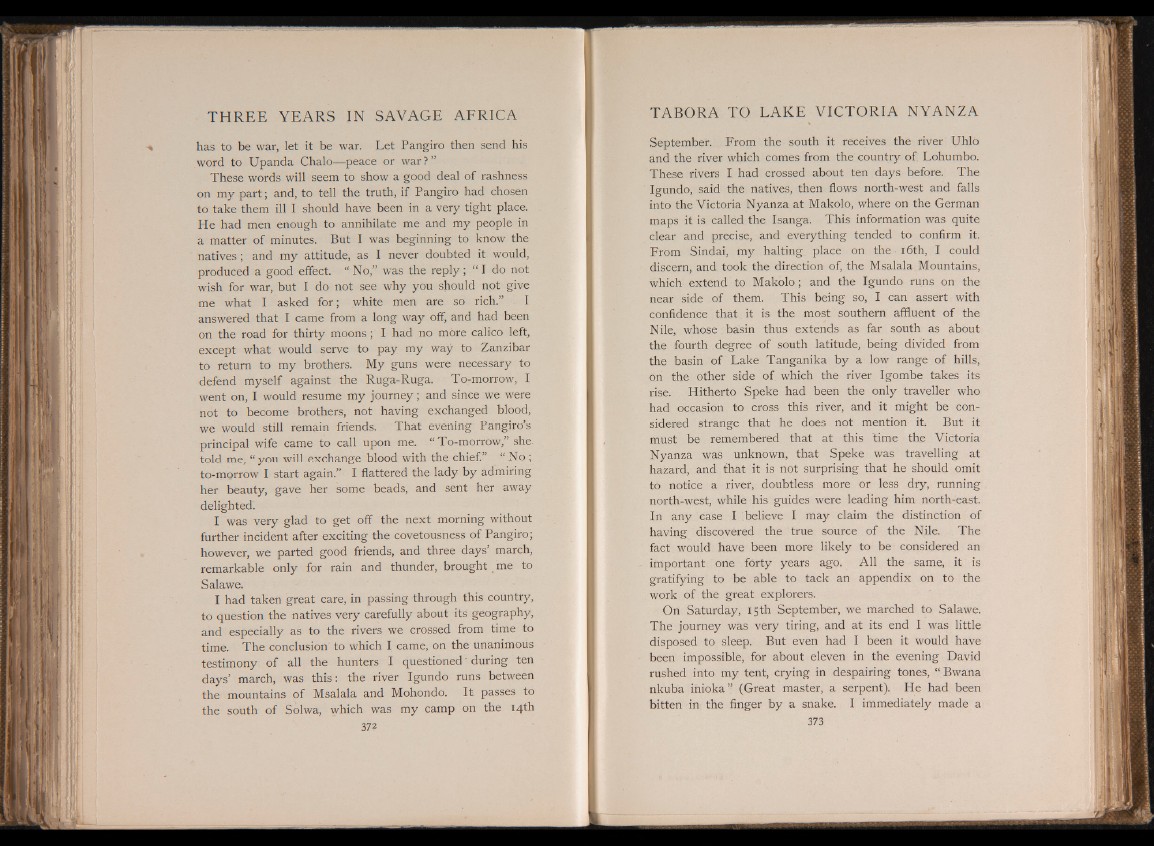
has to be war, let it be war. Let Pangiro then send his
word to Upanda Chalo—peace or war?”
These words will seem to show a good deal of rashness
on my part; and, to tell the truth, if Pangiro had chosen
to take them ill I should have been in a very tight place.
He had men enough to annihilate me and my people in
a matter of minutes. But I was beginning to know the
natives; and my attitude, as I never doubted it would,
produced a good effect. “ No,” was the reply; “ I do not
wish for war, but I do not see why you should not give
me what I asked for; white men are so rich.” I
answered that I came from a long way off, and had been
on the road for thirty moons; I had no more calico left,
except what would serve to pay my way to Zanzibar
to return to my brothers. My guns were necessary to
defend myself against the Ruga-Ruga. To-morrow, I
went on, I would resume my journey; and since we were
not to become brothers, not having exchanged blood,
we would still remain friends. That evening Pangiro’s
principal wife came to call upon me. “ To-morrow,” she
told me, “ you will exchange blood with the chief.” “ No;
to-morrow I start again.” I flattered the lady by admiring
her beauty, gave her some beads, and sent her away
delighted.
I was very glad to get off the next morning without
further incident after exciting the covetousness of Pangiro;
however, we parted good friends, and three days march,
remarkable only for rain and thunder, brought me to
Salawe.
I had taken great care, in passing through this country,
to question the natives very carefully about its geography,
and especially as to the rivers we crossed from time to
time. The conclusion to which I came, on the unanimous
testimony of all the hunters I questioned' during ten
days’ march, was this: the river Igundo runs between
the mountains of Msalala and Mohondo. It passes to
the south of Solwa, which was my camp on the 14th
37?
September. From the south it receives the river Uhlo
and the river which comes from the country of Lohumbo.
These rivers I had crossed about ten days before. The
Igundo, said the natives, then flows north-west and falls o 7 into the Victoria Nyanza at Makolo, where on the German
maps it is called the Isanga. This information was quite
clear and precise, and everything tended to confirm it.
From Sindai, my halting place on the 16th, I could
discern, and took the direction of, the Msalala Mountains,
which extend to Makolo; and the Igundo runs on the
near side of them. This being so, I can assert with
confidence that it is the most southern affluent of the
Nile, whose basin thus extends as far south as about
the fourth degree of south latitude, being divided from
the basin of Lake Tanganika by a low range of hills,
on the other side of which the river Igombe takes its
rise. Hitherto Speke had been the only traveller who
had occasion to cross this river, and it might be considered
strange that he does not mention it. But it
must be remembered that at this time the Victoria
Nyanza was unknown, that Speke was travelling at
hazard, and that it is not surprising that he should omit
to notice a river, doubtless more or less dry, running
north-west, while his guides were leading him north-east.
In any case I believe I may claim the distinction of
having discovered the true source of the Nile. The
fact would have been more likely to be considered an
important one forty years ago. All the same, it is
gratifying to be able to tack an appendix on to the
work of the great explorers.
On Saturday, 15th September, we marched to Salawe.
The journey was very tiring, and at its end I was little
disposed to sleep. But even had I been it would have
been impossible, for about eleven in the evening David
rushed into my tent, crying in despairing tones, “ Bwana
nkuba inioka ” (Great master, a serpent). He had been
bitten in the finger by a snake. I immediately made a